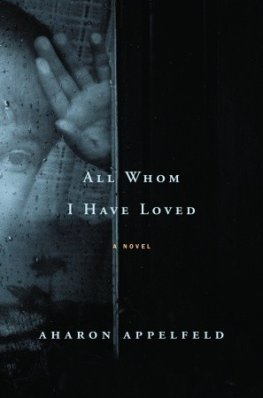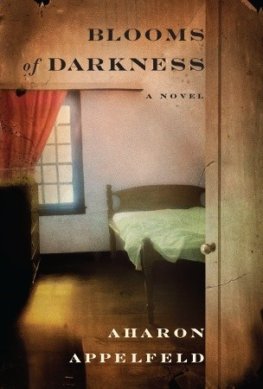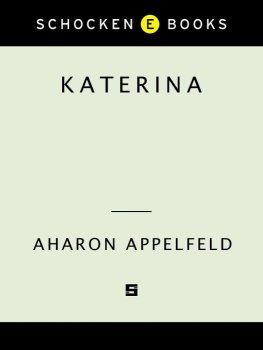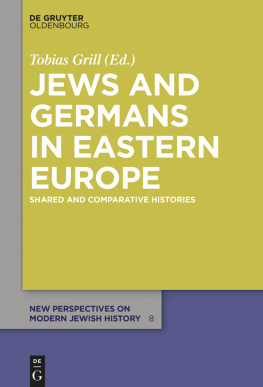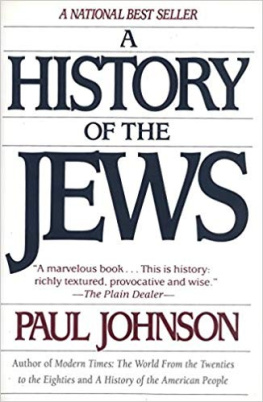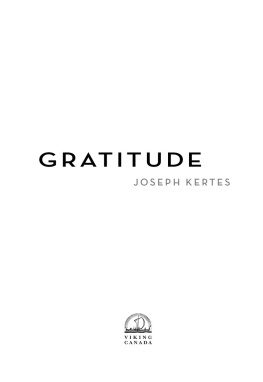Aharon Appelfeld
All Whom I Have Loved
My father and my mother their life together was not happy. They did not quarrel and they did not blame each other, but the silence in the house was as hard as ice and could have been sliced along its length. Sometimes my father's head would rise up, emerging out of this cold, as if he were about to shout. But this was just an illusion, for he did not raise his voice. I also learned not to disturb the silence, and I would sit on the floor playing dominos.
Father works until late, and when he appears at the front door, I put on my coat and go with him. We walk around the streets for hours and eventually we drop anchor in a caf. Father drinks a coffee and I, a hot chocolate. People sit differently in a caf than at home. They talk loudly and their voices flow. Only Father does not change. Sometimes it seems that among people his silence is more intense. In the evening he brings me back to my house. I still remember how he would sit on the floor and play dominos with me, go into the kitchen and prepare himself a cup of tea, and light a cigarette. Now he no longer crosses the threshold.
Why doesn't Father come inside? I ask Mother.
Mother shrugs and that's her answer. It's hard to know if she's hurt or angry. She, too, has learned how to keep silent. But in the evening, before I close my eyes, words return to her, and she sits on my bed and reads or tells me things. Her voice is open, her face full of light. The words flow from her, and it feels good to be close to her.
I turned nine, and Mother told me one day that Father would no longer be living with us but would come to visit me from time to time. I did not know what to ask and said nothing. Father is tall and lean, and even when he sits on the floor, he's taller than I am. With his legs crossed, he leans back on his arms. I knew that from then on we would no longer be playing at home, just in the park. In the park Father's silence is attentive; occasionally he'll say a word or a sentence, but aside from that, nothing.
On days when it's not raining, we walk along the river. Even here he hardly speaks. If I ask something, he'll answer with a word or two. On the way, we come across wooden houses with thatched roofs, wells from which sturdy peasant women pull up overflowing buckets, stray animals, and many wooden crosses, but most exciting of all are the chapels. They are usually near tall trees, and you can spot them by their miniature forms, as if children had built them. We go into one with our heads bent and are greeted by a small icon, at whose feet there's a shelf of dried flowers. There's a footstool on the floor, for kneeling. The icon is old and cracked, and the face of a tortured man gazes from it. In one of the chapels we see an icon of a young woman carrying a baby close to her bosom; wonder is diffused over her full features. Father loves chapels. Once he's inside, his face is all attention, and he's alert. Sometimes a light glows in the chapel, casting shadows on the icons.
The outing with Father lasts until dark. The darkness by the water is more frightening than the darkness near the trees, perhaps because it brings to mind a sleeping animal. I grip Father's large hand and overcome my fear.
When it's cold, Mother wraps me in a warm coat and a woolen hat and Father takes me downtown. In the center of town, the streets are wide and the chestnut trees throw their shadows on the sidewalk; at every corner there's a caf or a fabric store. In the late afternoon a moist light hovers over the iron railings, and in the cafs a thick pall of cigarette smoke hangs in the air.
Father sits and plays chess with an elderly acquaintance. The man touches the chess piece and his hand trembles. When the game is most intense, I hear Father humming to himself. A game of chess can last an hour, sometimes two. Father plays and drinks coffee. I get a hot chocolate and a poppy seed cake. Father's fingers are long, his fingertips stained with tobacco. He moves the piece, dragging it slowly as if to say, that's it, no need to hurry, the enemy may be threatening, but he's not all that strong. It's easier for Father to talk to himself than to others. When he speaks to himself, entire sentences flow from his mouth. When he wins, he doesn't boast. With his back hunched over, he tries to appease his opponent.
It's already dark when we return home. The streets are empty, and here and there someone will pass, a lit cigarette in his mouth. When it's cold and there's a wind blowing, Father lifts me in his arms, and then I can see straight into the gardens and inside the windows of houses. Sometimes I see a girl sitting and playing the piano, and even though there is no one next to her, I imagine that someone is listening.
I want to ask Father many things, but I don't. I know that he doesn't like it when he's asked things, so I hold myself back and swallow the words. Sometimes we drop in at the tavern. Father downs a drink or two and we hurry to leave, yet I grasp how the tavern is different from a caf. In the tavern, peasants sit around on the benches, heavy cigarettes hanging from their mouths. The air is dense with the smells of tobacco and beer, and young girls cheerfully pass around the tankards.
When I return home, Mother asks me: How was it?
To her question I respond with only All right.
It's hard for me to part from what I've seen, and all through the night, these sights filter into my sleep. In sleep everything is different and sometimes the opposite, even Father's silence. Sometimes it seems that Father has lost control. His mouth is gaping open, and he is seized with fury, hitting people on both sides of him. People are scattering, but he's fast and grabs them; only when they promise to obey him does he let them go. I wake up from sheer terror. Mother rinses my face with water and takes me into her bed. It's hard to fall asleep again.
I see Father once a week. When he's away or busy, he doesn't come. His face disappears from my memory, and when he comes back, he seems like a different person.
Then it was summer, and Mother and I left for the country. The village is all woods and fields, and streams from the River Prut that winds through them. Mother rented a small house next to the water; she unpacked the suitcase and put on her green dressing gown. I stood at the window and saw no trace of streets, only children and sheep and horses galloping over the green fields.
Later, a peasant woman brought a basket with fruit, bread, and butter, and Mother paid her with two banknotes. The woman folded the notes, put them into a kerchief, and tied it up. Mother asked if she had vegetables in her garden, and the peasant woman smiled. I have all kinds. She promised to bring some.
Then it was night, and Mother spread butter on slices of bread and served them on an earthenware plate. The bread was fresh and tasty, and with each bite I felt the tiredness from the journey. I tried very hard not to close my eyes, I drank water and I talked, but the tiredness was heavy and it overcame me. From within my sleep, I felt Mother's hands as she carried me to bed.
When I awoke, the sun was already full at the window. Mother prepared breakfast and said: We'll soon go down to the river. We sat at the table, and we saw how the sun bathed the two rooms of the house with its light, and for a while we were filled with wonder.
This was how our vacation in the country began. We would get up early, eat something light, and then go to the river. The river was not deep and flowed quietly. The first dip would be cold, and immediately we would wrap ourselves in towels and jump around to warm up, but the higher the sun climbed, the more it would warm the water, and so we would dip in again and again. Mother would swim. Her strokes were rhythmic and supple. I was afraid when she swam out far and glad when she came back to me.

